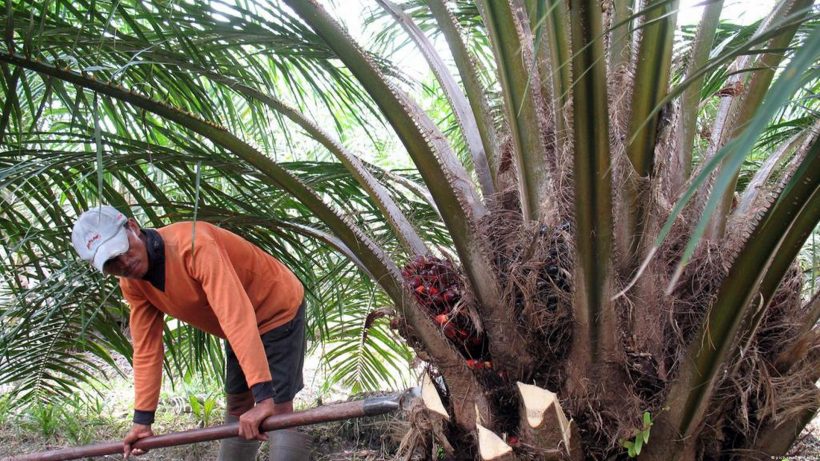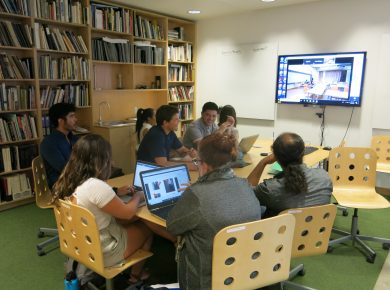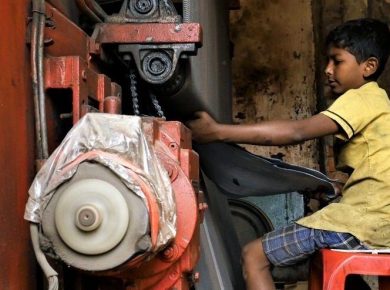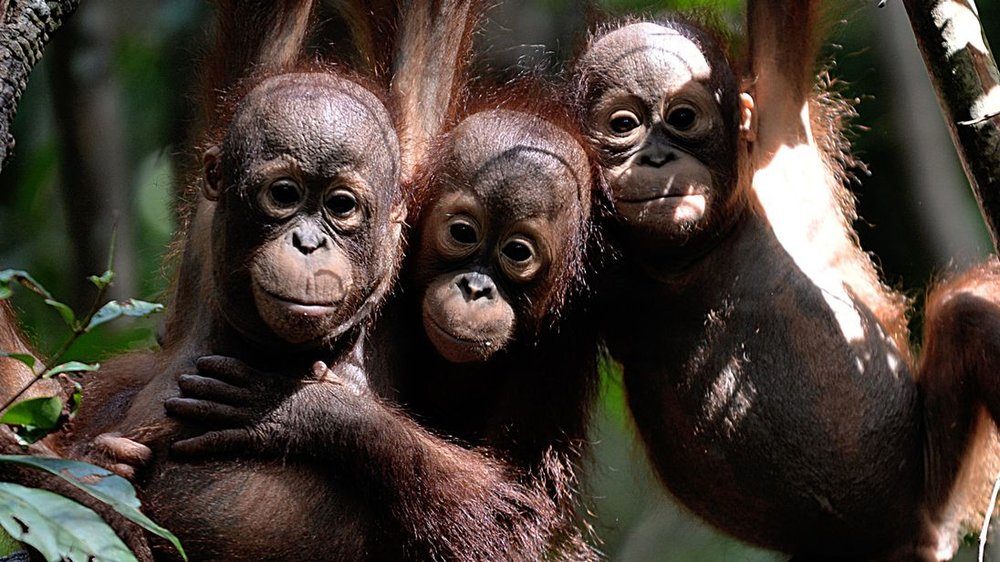
Borneo’s orang-utan population has declined by more than half since 1999 due to palm oil production and logging. Picture: Sky News.
Of all the imagery to emerge around palm oil, one of the most tragic has been the video, captured by Wildlife SOS, of an orang-utan galloping along the trunk of a felled tree to administer a frustrated, impotent blow to the bulldozer destroying his home. The ravage is happening so that acres of palm oil, an ingredient found in almost half of products on Western supermarket shelves – including biscuits, snack bars, cereals and margarine to soaps and shampoos – can be planted.
Today, rainforest area the equivalent of 300 soccer fields is being destroyed every hour – at enormous costs to humans, animals and environment. Palm oil production is resulting in widespread deforestation Indonesia and Malaysia, destroying habitats of many critically endangered species such as the orangutan and making a major contribution to climate change. According to a study by Current Biology Journal, Borneo’s orang-utan population has declined by more than half since 1999 due to palm oil production and logging.
Luckily, environmental groups and companies have begun campaigning for greater use of sustainable palm oil – or using none at all. Nutella (once the most demonised of palm oil users) and Lush, for example, are well on their way to eradicating palm oil from products.
Meanwhile, Iceland became the UK’s first supermarket to remove palm oil from its own label products. “We were already halfway through our programme to remove palm oil from 130 Iceland product lines,” says Keith Hann, director of corporate affairs, proudly. “This will be completed by the end of the year, By then, we will also have launched some 200 new products free of palm oil.”
Meanwhile, Nutella has been a member of the Roundtable on Sustainable Palm Oil (RSPO), a global initiative for sustainable palm oil, since 2015. Its goal: to “transform the markets by making sustainable palm oil the norm”. And yet, nothing about palm oil is as black and white as it seems. Oil palms yield up to 10 times more oil per hectare than other vegetable oil crops – which means simply replacing it will require even more land given over to intensive agriculture.
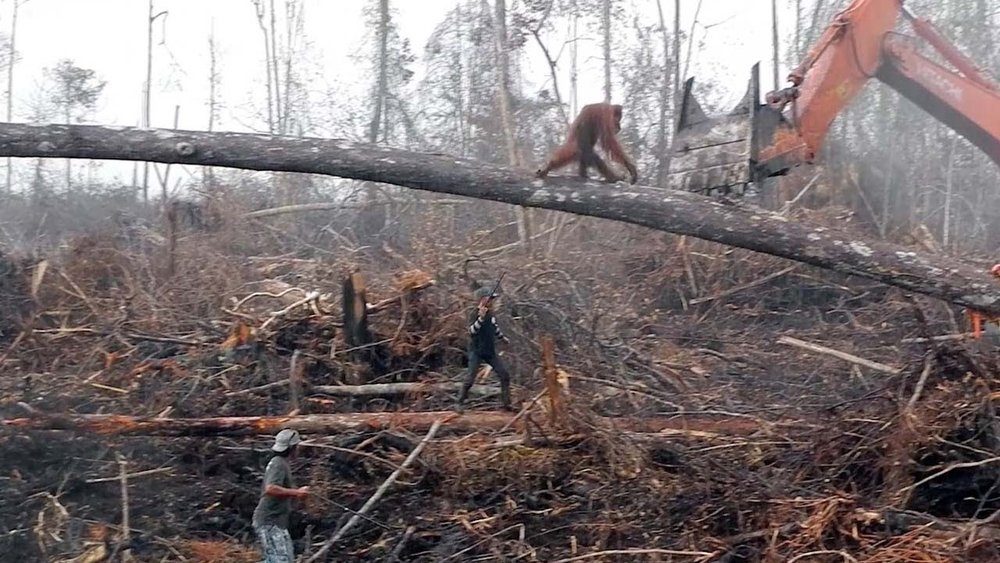
An orang-utan tries to attack the bulldozer destroying his home. Picture: Wildlife SOS.
And, while the RSPO seems like an option, rumblings say that there is little evidence that the scheme is preventing the destruction of either wildlife or environment. When it comes to palm oil, no one knows quite how to define ‘sustainable’ – with the result that regulation is poor.
Writer Leanna Coleman speaks to frontline campaigners from three very different groups to find out the truth about this controversial vegetable oil, its consequences on wildlife and forests and whether solutions exist. Louis McCulloch is Communications Assistant at Chester Zoo. Keith Hann is director of Corporate Affairs at Iceland Foods. Mathias Rittgerott, editor of Rainforest Rescue, which runs a website filled with information.
LEANNA: There are varied opinions about palm oil, from demonising the crop, to it not actually being the problem. What’s the truth?
LM, CHESTER ZOO: Because palm oil is cheap and efficient, it is the world’s most widely used vegetable oil. Demand for palm oil has resulted in the rapid and unregulated expansion of oil palm plantations, particularly in Malaysia and Indonesia, where around 85% of the world’s palm oil is now produced. Vast areas of rainforest – once home to orangutans, tigers, elephants and rhinos – have been cleared to make way for oil palm trees. Yet growing oil palm trees is the most efficient use of land for oil, producing twice as much as coconut trees and over thirty times as much as maize. This means that palm oil has the potential to be very environmentally friendly – if it is grown sustainably. If we were to stop using palm oil, we would need to find an alternative to supply the global demand for edible vegetable oils, so even more land would need to be converted to agriculture. Sustainable palm oil offers hope!
KH, ICELAND: We recognise that palm oil’s high yield compared with alternative crops means that it could offer significant environmental advantages, which is why we have made it very clear throughout that our objection is not to palm oil per se, but to deforestation. Nor have we called on other retailers to follow our example and stop using palm oil altogether. Our Managing Director Richard Walker expands on this in his blog: http://about.iceland.co.uk/2018/04/23/why-is-iceland-against-palm-oil/. We decided to act on palm oil because we do not believe that genuinely sustainable palm oil is available in the mass market to retailers like Iceland, and we consider that the devastation being caused to tropical rainforests, endangered species and local people by continued deforestation, driven by growing global demand for the product, is unacceptable.
MR, RAINFOREST RESCUE: The palm itself is not the problem. The problem is that it grows only in areas where the natural vegetation is rainforest or peat forest. For palm oil plantations, millions of hectares of these forests have been clear cut destroying habitat of animals like orangutans and the livelihood of millions of people, among them many indigenous. The destruction of forests releases huge amounts of greenhouse gases and worsens climate change.
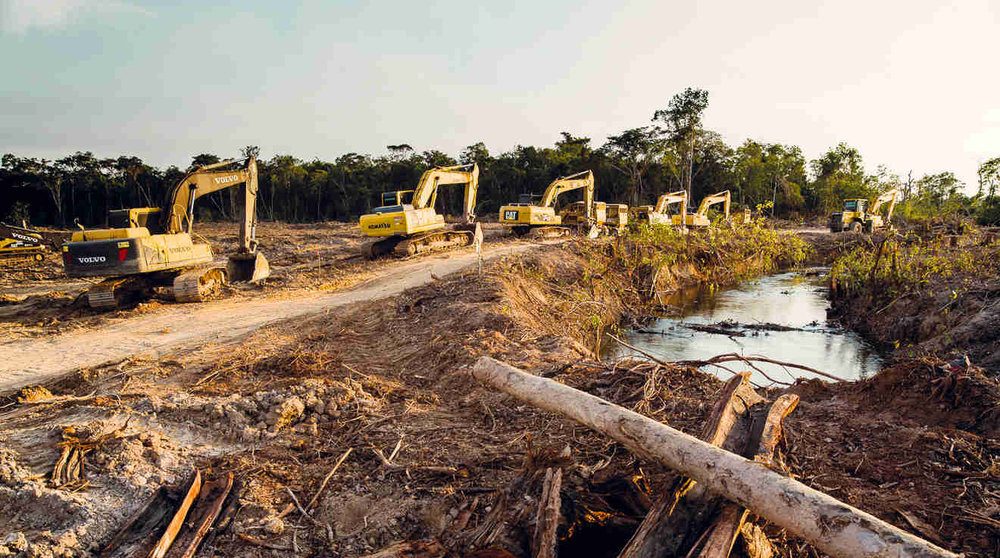
“The problem is that palm oil grows only in areas where the natural vegetation is rainforest or peat forest.” Picture: Rainforest Rescue.
LEANNA: If all palm oil was sustainable, would deforestation still be happening and would wildlife still be in danger?
LM, CHESTER ZOO: At the moment, sadly yes. Chester Zoo supports the work of RSPO, which has developed sustainability standards for palm oil produced with minimal impact on wildlife, local people and the environment. Some companies are even taking further steps to become ‘deforestation-free’, something we are definitely striving to promote further. We are working, with others, to improve standards to make palm oil production even more sustainable. It is the best hope if we are to prevent the extinction of wildlife.
KH, ICELAND: The delivery to the mass market of genuinely sustainable palm oil that did not involve further deforestation would clearly be of huge benefit to endangered wildlife.
MR, RAINFOREST RESCUE: There is no “sustainable palm oil” because, at some point, rainforest is cut. You can’t call plantations “sustainable” only because the destruction happened many years ago. There are only more or less carefully managed plantations. And even there, the environmental damage is huge: plantations always lack biodiversity and can never host as many species as forests.
LEANNA: What can ordinary people do to help protect the rainforests and their wildlife from destructive palm oil development?
LM, CHESTER ZOO: In recent years, a number of organisations have started to produce and source palm oil more sustainably. Buying only products that contain certified sustainable palm oil is an important step in helping to protect animals like orangutans and others that share its rainforest habitat. Shoppers can look out for the RSPO logo, but we realise it’s not always that easy to identify what products are sustainable, so we’ve created a handy shopping list to show which products are your best options next time you go to the supermarket: https://www.actforwildlife.org.uk/get-involved/take-conservation-action/take-the-sustainable-palm-oil-challenge/shopping-list/
KH, ICELAND: Ordinary people can help to protect the rainforests and endangered species by supporting retailers and manufacturers that either do not use palm oil for the time being, or have demonstrated a strong and verifiable commitment to ensuring that any palm oil they do use comes from genuinely sustainable sources.
MR, RAINFOREST RESCUE: Just don’t buy processed food that contains palm oil like many brands of pizza, chips, sweets. Cook with locally grown fresh vegetables, etc Try to avoid soaps, shampoos, detergents that contain palm oil. It depends where you live: in the EU lots of palm oil is added to biofuels. The only way to avoid that is to drive less by car and use your bike, public transit instead.
